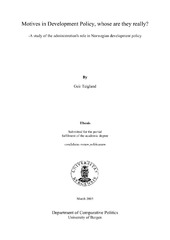| dc.description.abstract | Engaging in a study of the administration’s role in Norwegian development policy, this thesis explores the microfoundations of development assistance in relation to the concept of motives in development policy.In this thesis, the common practise of attributing the motives that lie behind development policies to a “collective actor” – the state – is found to be dubious and misguided. Exploring the history of Norway as a donor provides the possibility for commenting on some of the stated motives; however, it also becomes apparent through the historical review that there is more to the issue of aid motivation than what is represented by the stated guiding motives. Attempting to establish a better conception of the holder of motives behind development policy, the administration’s role is identified as an interesting point of departure. Establishing the role of the administration in the formation of development policy is believed to provide the possibility for scrutinising the concept of the state as a singular and unitary actor.Performing the analysis based on empirical material generated by a distributed survey and follow-up interviews, the administration is indicated to be a sizable actor in the field of development policy. The scope and volume along with the complex issues making up the policy field, are found to tilt the advantage in favour of the administration. However, although the administration is characterised as being resourceful and central, the political authorities are found to be decisive in drawing up the broad lines and the general structure framing the manoeuvrability of the administration. Thus, the macro-policies are found to be the domain of the politicians while the bureaucrats enjoy considerable latitude on the more specific micro-level. Relating the findings of the analysis to the overarching issue of motives in development policy, the concept of the holder of these motives as a “collective actor” seems satisfactory only on the most abstract level. On a more detailed micro-level the exploration of the administration’s role in development policy have provided insight into aspects concerning the microfoundation of development assistance and thus established the domestic origin of national policies in the field of development policy. | en_US |
